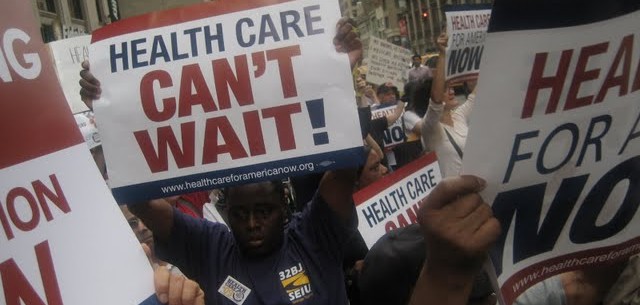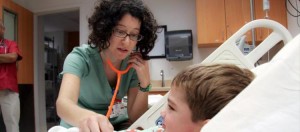NYC labor leaders and their community allies are sitting down to discuss the current state of health care in America, particularly for workers and trade unions. In the wake of the enactment of the Affordable Care Act in 2010, much change is underway: beneficial, problematic, and otherwise.
On Thurs. morning Feb. 27, Labor Press, an online news source, is hosting a gathering to bring various union movement stakeholders together to talk about how things are going, what’s been accomplished, what challenges they are facing, and a the vision for the longer-term. The summit kicks off with remarks from the new Speaker of the New York City Council, Melissa Mark-Viverito, and features R. Thomas Buffenberger, President of the International Association of Machinists and Aerospace Workers, as the keynoter. Three panels then follow.
The first panel, “Navigating the New Healthcare World”, moderated by Mark Hannay (Metro New York Health Care for All Campaign), features Tom Canty (Empire Blue Cross Blue Shield), Frank Proscia (Doctors’ Council, SEIU), Michael Jordon (MagnaCare), William Friedman (Health Republic), Joseph Malloy (North Shore LIJ), and Jerry Gallo (EmblemHealth).
The second panel, “Meeting New Healthcare Challenges”, moderated by Oren Levin-Waldman, (Metropolitan College of NY), features Jack Lepetich (Empire Blue Cross Blue Shield), Joseph Berardo (MagnaCare), William Friedman (Health Republic), Stephen Magla (Pitta Giblin LLP), Susan McQuade (NY Committee on Occupational Safety and Health), and Larry Cary (Cary Kane LLP).
The summit’s final panel, “ACA Passage and Winning an Improved and Better Plan”, moderated by Gene Carrol (NYS AFL-CIO/Cornell Union Leadership Institute), features Richard Gottfried (NYS Assembly), Mitra Behroozi (1199 SEIU Pension and Benefit Funds), Oliver Fein (Physicians for a National Health Program), Edward Kaplan (Segal and Co.), George Bueno (Office and Professional Employees International Union), John August (Cornell ILR School), Howard Raphaelson (Raphaelson and Levine), Howard Gold (North Shore LIJ), Paul Zurlo (EmblemHealth).
The summit is being held at the NYC District Council of Carpenters on Hudson St. in Manhattan. Full details and reservations are at www.laborpress.org


